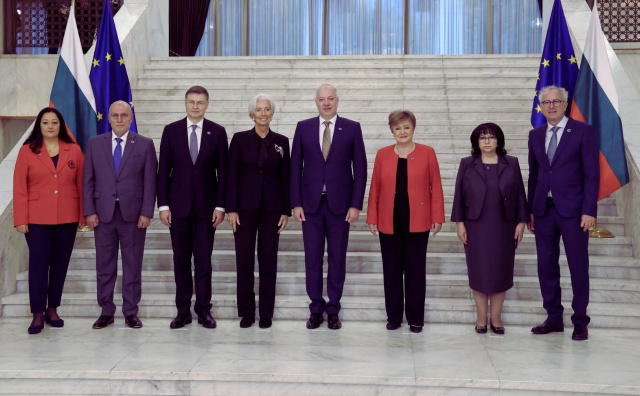Copyright novinite

High-level conference marks final stretch before Bulgaria becomes 21st eurozone member on January 1, 2026 Bulgaria took center stage in European finance today as the country's top officials welcomed the continent's most influential economic leaders to Sofia for a landmark conference on the nation's imminent adoption of the euro. The high-level forum "Bulgaria on the Threshold of the Eurozone," held at the prestigious Boyana Residence, brought together a who's who of European financial power to celebrate and discuss Bulgaria's historic transition. A Birthday to Remember In perhaps the most memorable moment of the day, European Central Bank President Christine Lagarde revealed a personal connection to Bulgaria's euro adoption that brought warmth to the technical proceedings. "January 1, 2026 - my heart will beat for you, Bulgaria, as I celebrate my 70th birthday. This will be a special moment, I assure you. Maybe I will actually bring some good Bulgarian wine to celebrate this day, because this is what is usually done on a birthday," Lagarde announced to the audience. The symbolic gesture underscored the significance of the moment: Bulgaria will become the 21st member of the eurozone on the exact day Lagarde turns 70, creating a personal milestone that mirrors the nation's historic achievement. Further reading: Christine Lagarde: The Euro Will Bring Bulgaria Prosperity and Security Europe's Elite Endorse Bulgaria's Readiness The conference assembled an unprecedented gathering of financial leadership: Christine Lagarde, President of the European Central Bank Kristalina Georgieva, Managing Director of the International Monetary Fund Valdis Dombrovskis, European Commissioner for Economy and Productivity Pierre Gramegna, Managing Director of the European Stability Mechanism Prime Minister Rosen Zhelyazkov Finance Minister Temenuzhka Petkova Dimitar Radev, Governor of the Bulgarian National Bank Lilyana Pavlova, former Vice President of the European Investment Bank The consensus was clear: Bulgaria is ready. "I can say with confidence that Bulgaria is ready to successfully introduce the euro from January 1, 2026," declared Finance Minister Petkova, emphasizing that preparations are complete at both national and local levels. Not a Destination, But a Beginning Despite the celebratory mood, speakers were careful to emphasize that euro adoption marks the start of a journey, not its conclusion. "Joining the euro is not the final destination, but the beginning of the journey," Lagarde stated, invoking Bulgarian national hero Vasil Levski: "The people's cause is above all. The decision to adopt the euro embodies this cause." She outlined the concrete benefits awaiting Bulgarian businesses: "For Bulgarian companies, whether they are large corporations or small and medium-sized enterprises, there will be no currency conversion costs. Small and medium-sized enterprises will save 1 billion euros per year in exchange costs." Lagarde also highlighted Bulgaria's deep integration with Europe: "65% of Bulgaria's exports go to the European Union. 45% of it is in the eurozone." Over the past decade, Bulgaria's GDP has increased from one-third to two-thirds of the EU average, driven by European economic integration. The Geopolitical Dimension European Commissioner Valdis Dombrovskis placed Bulgaria's accession in a broader strategic context, noting that the current global environment makes eurozone membership even more valuable. "The world today is more fragmented and more conflicted in geopolitical terms. Therefore, it makes even more sense to be part of a larger political and economic bloc. Joining the eurozone is not just joining a monetary union - it means being part of the core of the European Union," Dombrovskis explained. He pointed to the Baltic states as proof that eurozone membership provides tangible protection: despite geopolitical risks following Russia's invasion of Ukraine, Latvia, Lithuania, and Estonia have maintained lower borrowing costs than non-eurozone countries like Poland and Hungary. "Investors perceive membership in the eurozone as a stabilizing factor. When a country joins, the value of debt decreases because markets see it as a sign of financial stability and good governance," the commissioner added. IMF's Warning: Benefits Aren't Automatic While endorsing Bulgaria's readiness, IMF Managing Director Kristalina Georgieva delivered pointed warnings about challenges ahead. "The economy is overheating a bit. Our population is declining, the 'brain drain' continues to hit us. How do we cope? There is only one answer to this question - with responsible policies aimed at protecting the economy and increasing the productivity of the private sector," Georgieva cautioned. She emphasized that fiscal discipline must improve, not relax, after euro adoption: "Fiscal discipline has served Bulgaria so well over the decades, but now it must serve even better. The priorities we see are containing public sector wage growth to cool domestic demand, increasing pension contributions to limit the pension system deficit, and increasing high-quality public investment." Georgieva was blunt about expectations: "The euro will help, but by itself, it does not guarantee a higher standard of living. It must be combined with good policies." Her comments took on added significance given that the controversial 2026 budget, featuring 10.5 billion euros in new debt and significant tax increases, had been published just hours before the conference. Further reading: IMF’s Georgieva: From January 1, Bulgaria Joins Eurozone Decision Table with Full Rights Bulgaria's Response: Trust is Growing Prime Minister Rosen Zhelyazkov acknowledged the political challenges of the euro adoption process, particularly opposition from what he called "anti-European political actors" who have deliberately undermined public trust. "Despite this, most Bulgarians continue to choose the European path 'with their hearts.' Currently, we are seven percentage points in favor of trust," he reported, noting that support has been steadily growing. According to government data, over 51% of Bulgarians now support euro adoption - a significant shift from earlier skepticism. Business support has been consistently strong throughout the process. "I am certain that on January 1, 2026, Bulgaria will welcome the new currency as a symbol of the maturity of our European democracy," Zhelyazkov declared. Further reading: Bulgaria’s Big Leap: PM Zhelyazkov Says the Country Is Set for the Euro No Other Direction Bulgarian National Bank Governor Dimitar Radev framed the question in stark terms: "Bulgaria is one of the oldest modern European countries with a deeply embedded European identity. Can a country like ours have any other direction and affiliation than the eurozone? The answer is 'no.'" Radev highlighted Bulgaria's track record: "We, despite certain episodes of difficulties, have generally been conducting sound macroeconomic policy over a long period of time. The result: one of the lowest debt-to-GDP ratios in Europe and beyond." However, he posed the crucial question: "Will we maintain this sensible macroeconomic policy even after we become part of the eurozone?" The BNB governor promised that his institution would be "a critical and at the same time constructive voice" within the eurozone framework. Further reading: Bulgaria’s Economists Warn: Eurozone Membership Doesn’t Shield Against Fiscal Mismanagement From Periphery to Core Lilyana Pavlova, who moderated the forum, captured the transformative nature of the moment: "The euro is a bridge between generations, between economies, between future and past. Bulgaria is not just changing its currency - it is changing its dimension, from the periphery to the heart of Europe." She emphasized that the adoption is strategic, not merely technical: "Europe today cannot be just a market, it must be a force: economic, industrial, technological and moral." Pierre Gramegna from the European Stability Mechanism offered reassurance about eurozone safety nets: "If something really goes wrong in a country, there is someone to help. We have helped five countries in the last 10 years." He was adamant: "There are no risks from adopting the euro." Symbolic Signing At the conclusion of the event, ECB President Lagarde and BNB Governor Radev symbolically signed a transparent plaque displaying euro banknotes during their joint press conference - a gesture marking Bulgaria's final approach to monetary union. Further reading: First Look at Bulgaria’s Euro: What the New Banknotes Will Look Like from 2026 (VIDEO) The Road Ahead As Bulgaria enters the final weeks before its January 1, 2026 transformation, today's conference served multiple purposes: celebrating achievement, building public confidence, and, perhaps most importantly, sending clear signals about the responsibilities that accompany eurozone membership. The timing of the event, coming just one day after the publication of the controversial 2026 budget, created an implicit tension. While European leaders praised Bulgaria's fiscal stability and low debt levels, the IMF's pointed warnings about the need for continued discipline seemed to reference the budget's deficit spending and lack of structural reforms. Finance Minister Petkova acknowledged this duality: "The eurozone means not only advantages, but also responsibility. Bulgaria is committed to guaranteeing financial stability." With just eight weeks remaining until Bulgaria officially adopts the euro, the message from today's gathering was clear: the hard work of economic reform doesn't end on January 1 - it intensifies. Bulgaria may be joining Europe's economic core, but staying there will require the same fiscal discipline and reform commitment that brought the country to this threshold. As Christine Lagarde prepares to toast her 70th birthday with Bulgarian wine, the country she'll be celebrating with faces both unprecedented opportunity and sobering responsibility. The euro, as speakers repeatedly emphasized, is not a destination - it's the beginning of a journey that will define Bulgaria's place in Europe for generations to come.



